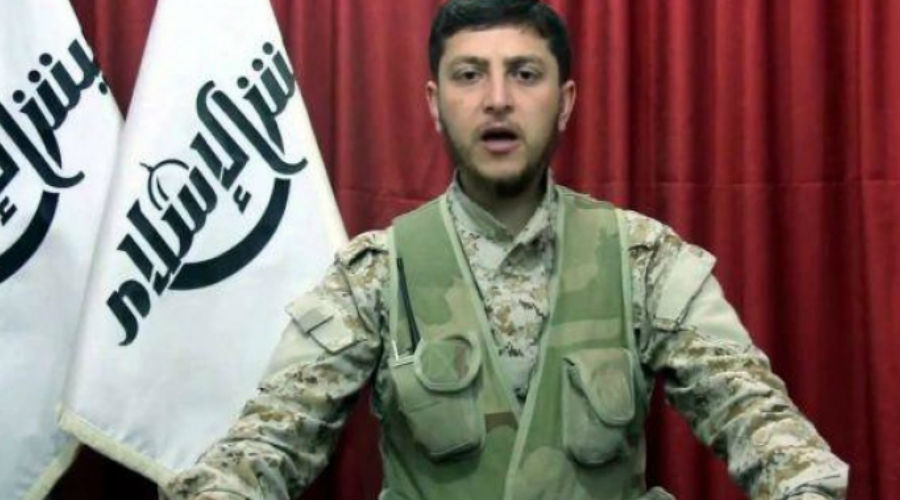Several indications reveals that Douma City, the last stronghold of the armed factions, will witness a new escalation in the coming period, especially because negotiations between Jaish al-Islam, on the one side, and the Syrian regime and Russia, on the other, became complicated. At the same time, fighters from other factions and their families and civilians continue to leave the towns of Harasta, Arbeen and Ain Tarma to the provinces of Hama and Idlib in the north of Syria.
Media outlets affiliated with the Syrian regime noted that the regime forces and allied militia were deployed in preparation for military action aimed at surrounding and storming the city if negotiations fail. Failure would be the outcome of conflicting views between the two involved sides. That is, the militants want to stay in the city and a ceasefire in place while Russia and the regime insist that they should leave.
The regime appears to be seeking to anticipate the outcome of negotiations before a trilateral summit is held in early April between Russian President Vladimir Putin, Turkish President Recep Tayyib Erdogan and Iranian President Hassan Rouhani. Preparations are being currently made for the summit to reach agreement on political and security arrangements in the future, especially in the areas of influence of the three involved parties.
Two Main Tracks
Overall, these developments provide several indications the most prominent of which is that the outcome of the next rounds of the Astana talks - which imposed the reality of establishing four de-escalation zones including Eastern Ghouta - was not the end as armed factions continued to be stationed on the peripheries of regime-held areas. Rather it was a preemptive move by the regime to restore these outer limits and reformulate arrangements so as to be able to expand its influence to them.
In light of this, it can be said that there are two scenarios for developments in Douma in the coming period.
In the first scenario, negotiations would continue, where either party would change its position and make concessions that may allow Jaish al-Islam to keep non-effective presence so that its demand for preventing enforced displacement and demographic change, according to statements by the faction’s military spokesman Hamza Birqdar.
Local reports indicated that a meeting held on March 29 between a committee representing factions operating in southern Damascus and a group of Russian military officials at the al-Rahwanji checkpoint, in a regime-controlled area between the town of Babbila and the district of Sidi Miqdad. During the meeting, the Russian officials offered an option whereby militants can stay after their situation is settled while those who decline the offer can leave to the north and south of Syria. It was agreed that another meeting was to be held after a few days after the factions asked to be given time to hold consultations with each other.
In the second scenario, the strategy of the “scorched-earth strategy” pursued by the Syrian regime and allied militias, would be also pursued in the remaining areas of Eastern Ghouta. This is a likely scenario due to two considerations.
Firstly, the military weight of the factions declined gradually in the past period. Secondly, Douma is strategically important for these factions because it is the largest battlefield in Eastern Ghouta, which means that the regime would make a major gain if it succeeds in settling this battle in its favor, especially because the city is a gateway to Eastern Ghouta which encircles the capital Damascus.
Field indications reveal that the regime is preparing for storming Douma and issuing threats to Jaish al-Islam. Local reports quoted a Syrian military official as saying that all forces operating in Eastern Ghouta headed to Douma to prepare for a massive military operation if Jaish al-Islam refuses to surrender the city and leave. Other reports indicated that the regime forces, backed by Russia, Iran and allied militias, are preparing to break through the city front lines through Misraba and the surrounding farms.
Potential Implications
These overall developments would impose several implications that can be outlined as follows:
1- Factions Breaking up. Disagreement between the armed factions widened in the past period. Some of them accuse Ahrar al-Sham and Failaq al-Rahman, which took part in negotiations to withdraw from positions in the towns of Jobar, Arbeen and Ain Tarma of “treason”. They emphasize that there was no reason for having these positions destroyed if they eventually surrender. The two factions responded by saying that they do not want to continue to suffer civilian losses in particular due to continued armed standoffs.
2- Strengthening the Regime’s Gains. The regime may be able to control the last major stronghold of these organizations at a time when the Free Syrian Army factions are busy with military operations conducted by the Turkish forces in Afrin and other coming battles. There are several views that this is is partially due to the fact that the regular forces succeeded in dividing the areas controlled by these factions into three separate pockets. This imposed strong pressure on the factions and pushed some to accept to take part in negotiations sponsored by Russia.
3- Formulating New Arrangements. The field shifts in this area will impose a new balance of power that is in favor of the regime. This balance would support its position in any coming negotiations with the involved organizations. Indications of this likelihood would surface in the trilateral summit to be held in Ankara in early April.
But despite this, the increasingly likely success of the regime in winning the last round of confrontations in Eastern Ghouta does not negate the fact that it will face several dilemmas in the coming period. This is particularly so in light of the other conflicts that Syria is witnessing, such as the military operations in Afrin. Additionally, vigorous efforts being made by a number of regional and international powers to perpetuate their influence in Syria will directly impact the potential trajectories of the crisis in the coming period.


